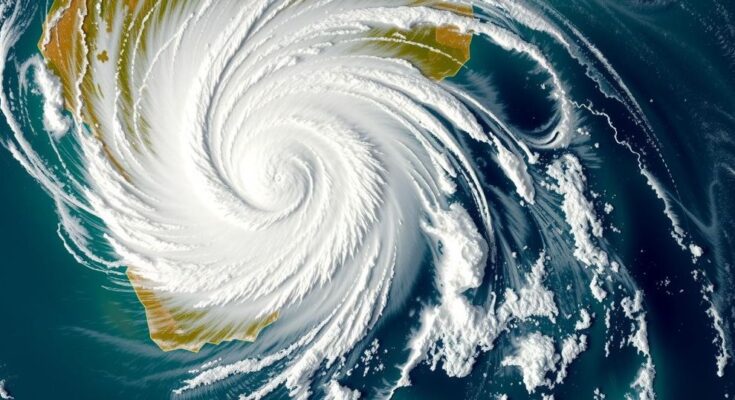Tropical Cyclone Chido is affecting around 2.7 million people in southern Africa, particularly in Madagascar, Mozambique, and surrounding nations. The cyclone has intensified significantly, prompting extensive preparedness and emergency measures across affected regions. Humanitarian organizations are mobilizing resources and disseminating safety advisories as the storm approaches landfall, with significant rainfall and winds expected.
Tropical Cyclone Chido is currently affecting approximately 2.7 million individuals across six southern African countries, particularly impacting Madagascar, Comoros, Malawi, Mozambique, Mauritius, and Seychelles. The cyclone, originally a tropical depression, intensified into a Category 4 storm before weakening to Category 3 but is forecasted to bring significant rainfall and winds upon landfall in Mozambique. Emergency preparedness measures are underway, including the repositioning of humanitarian supplies, extensive evacuations, and public awareness initiatives in the anticipated impact zones.
The cyclone formed between December 7 and 8 in the southeastern Indian Ocean and has been on a westward path, with projections estimating that it will pass close to northern Madagascar and approach Mozambique by December 15. The cyclone is expected to produce extreme weather conditions, including strong winds and heavy rainfall, particularly in Cabo Delgado and Nampula provinces of Mozambique, which are at significant risk. Other regions in southern Africa, such as Malawi, Zimbabwe, Zambia, Angola, and the Democratic Republic of the Congo, are also preparing for heavy rainfall.
Organizations are actively mobilizing resources, issuing advisories, and conducting necessary evacuation procedures. In Madagascar, the National Office for Risk and Catastrophe Management has implemented support mechanisms despite existing infrastructure challenges from previous cyclone impacts. The Comorian Red Cross and humanitarian partners in Mozambique and Malawi are coordinating disaster response efforts, engaging local communities, and prepositioning essential supplies to manage the unfolding crisis effectively.
Preparatory actions include community awareness campaigns, positioning of emergency resources, staff deployment to vulnerable regions, and activating communication protocols to ensure timely information dissemination during the cyclone’s impact. The situation is being closely monitored to assess needs and facilitate timely assistance to affected populations, prioritizing safety and preparedness as the cyclone approaches.
Tropical Cyclone Chido has become a significant concern in southern Africa as it threatens millions with heavy rainfall and severe winds. This weather event has prompted humanitarian agencies and governments to activate their disaster response mechanisms and prioritize the safety of those in the storm’s path. Countries including Madagascar and Mozambique, which face the brunt of the cyclone, are now in the stages of preparing for potential devastation, highlighting the ongoing challenges of climate-induced disasters in the region.
In conclusion, Tropical Cyclone Chido poses a serious threat to southern Africa, affecting nearly 2.7 million people across several countries. The preparedness and response measures initiated by local and international organizations underlines the urgency of addressing the humanitarian needs arising from such natural disasters. As the situation unfolds, effective coordination and resource mobilization will be crucial to mitigate the impact on affected communities and facilitate their recovery.
Original Source: reliefweb.int




